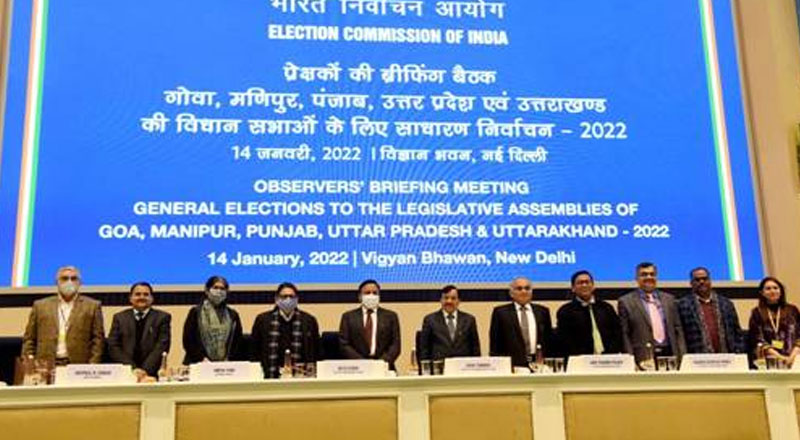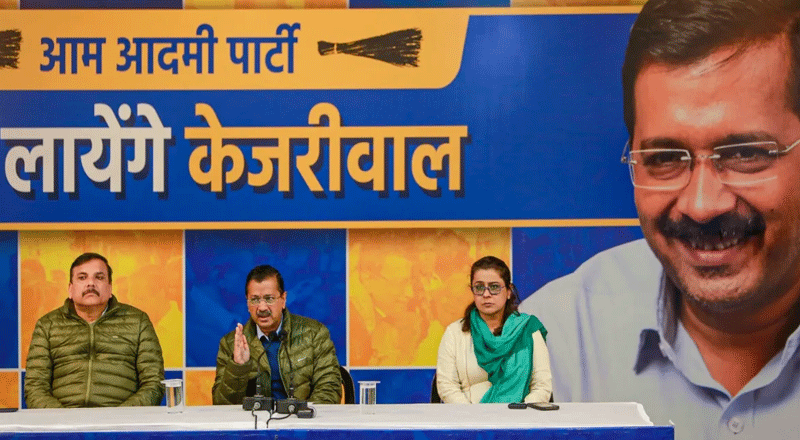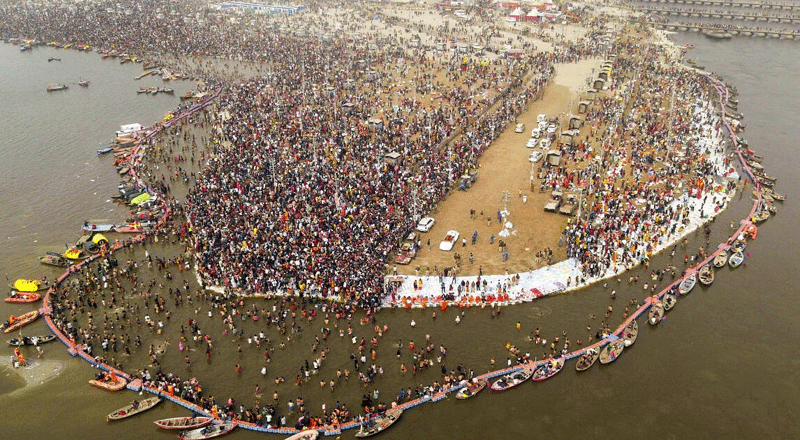The Election Commission of India today organized a briefing meeting for Observers to be deployed for the forthcoming General Elections to the Legislative Assemblies of Goa, Manipur, Punjab, Uttarakhand and Uttar Pradesh
The schedule for holding General Election to the Legislative Assemblies of Goa, Punjab, Manipur, Uttarakhand & Uttar Pradesh, 2022 has been announced on 08.01.2022. Polls in the states are to be held as per the schedule given below:
| Name of State/UT | Phase & Poll date |
| Punjab, Goa, Uttarakhand | Single phase – 14.02.2022 |
| Manipur | Two phases – 27.02.2022, 03.03.2022 |
| Uttar Pradesh | Seven Phases – 10.02.2022, 14.02.2022, 20.02.2022, 23.02.2022, 27.02.2022, 03.03.2022, 07.03.2022 |
In this regard, attention of all media is invited to the Section 126 of the Representation of the People Act, 1951 that prohibits displaying any election matter by means, inter alia, of television or similar apparatus, during the period of 48 hours before the hour fixed for conclusion of poll in a constituency. The relevant portions of the said Section 126 are re-produced below:
(126. Prohibition of public meeting during period of forty-eight hours ending with hour fixed for conclusion of poll-
(1) No person shall-
(a)…………………
(b) Display to the public any election matter by means of cinematograph, television or other similar apparatus;
(c)……………………
In any polling area during the period of forty-eight hours ending with the hour fixed for the conclusion of the poll for any election in the polling area.
(2) Any person who contravenes the provisions of sub-section (1) shall be punishable with imprisonment for a term which may extend to two years, or with fine, or with both.
(3) In this Section, the expression “election matter” means any. matter intended or calculated to influence or affect the result of an election
2. During elections, there are sometimes allegations of violation of the provisions of the above Section 126 of the Representation of the People Act, 1951 by TV channels in the telecast of their panel discussions/debates and other news and current affairs programmes. The Commission has clarified in the past that the said Section 126 prohibits displaying any election matter by means, inter alia, of television or similar apparatus, during the period of 48 hours ending with the hour fixed for conclusion of poll in a constituency. “Election matter” has been defined in that Section as any matter intended or calculated to influence or affect the result of an election. Violation of the aforesaid provisions of Section 126 is punishable with imprisonment up to a period of two years, or with fine or both.
3. The Commission once again reiterates that the TV/Radio channels and cable networks/internet website/social media platforms should ensure that the contents of the programmes telecast/broadcast/ displayed by them during the period of 48 hours referred to in Section 126 do not contain any material, including views/appeals by panelists/participants that may be construed as promoting/ prejudicing the prospect of any particular party or candidate(s) or influencing/ affecting the result of the election. This shall, among other things include display of any opinion poll and of standard debates, analysis, visuals and sound-bytes.
4. In this connection, attention is also invited to Section 126A of the R.P. Act 1951, which prohibits conduct of Exit poll and dissemination of its results during the period mentioned therein, i.e. the hour fixed for commencement of poll in first phase and half an hour after close of poll in last phase in the State.
5. During the period not covered by Section 126, concerned TV/Radio/Cable/FM channels/internet websites/Social Media platforms are free to approach the state/ district/ local authorities for necessary permission for conducting any broadcast/Telecast related events (other than exit polls) which must also conform to the provisions of the model code of conduct, the programme code laid down by the Ministry of Information and Broadcasting under the Cable Network (Regulation) Act with regard to decency, maintenance of communal harmony, etc. All Internet websites and Social Media platforms must also comply with the provisions of The Information Technology Act, 2000, Information Technology (Intermediary Guidelines and Digital Media Ethics Code) Rules, 2021 and ECI guidelines No-491/SM/2013/Communication, dt 25thOctober, 2013, for all political content on their platform. As regards political advertisement, the same needs pre-certification by the Committees set up at State/District level as per the Commission’s order No. 509/75/2004/JS-I, dt 15th April,2004.
6. Attention of all print media is also invited to the guidelines issued by Press Council of India dtd 30.07.2010 and ‘Norms of Journalistic Conduct- 2020’ to follow for observance during the election. (Annexure-I)
7. Attention of the electronic media is invited to the “Guidelines for Election Broadcasts” issued by NBSA dt 3rd March, 2014. (Annexure-II)
8. Internet and Mobile Association of India (IAMAI) has also developed a “Voluntary Code of Ethics” for all the participating social media platforms to ensure free, fair & ethical usage of their platforms to maintain integrity of electoral process during the General Elections to the Lok Sabha 2019. As agreed by IAMAI, vide letter dated 23.09.2019, the “Voluntary Code of Ethics” shall be observed during all elections. Accordingly, the Code is also applicable in GE to the Legislative Assemblies of Goa, Punjab, Manipur, Uttarakhand & Uttar Pradesh, 2022. Attention of all concerned Social Media platforms is invited to the “Voluntary Code of Ethics” dt 20th March, 2019 in this regard. (Annexure-III)
9. Attention is also drawn to IT (Guidelines for Intermediaries and Digital Media Ethics Code) Rules 2021 for compliance wherever applicable.
The above advisory should be duly observed by all the concerned media.





